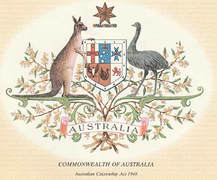
I'M ORIGINALLY a pale-skinned Yorkshire woman who burns in the sun. Part of me still is, except that, in early 1976, after only one year living in Australia, I joined with a friend’s family and, together, we became Australian citizens.
It happened in an anonymous office somewhere in Canberra, where I was living and working at the time. I don't remember much about it, to be honest. It seemed to be more of an administrative process than inspirational or emotional but I do remember, vividly, being asked at some point to renounce my allegiance to any other authority which, in my case, was to the Queen of England. For a blissful few seconds I was a free woman, owing allegiance to no one, until asked to swear my allegiance to – you’ve guessed it – the Queen of Australia, obviously wearing a different hat, perhaps slouch instead of floral, or maybe a special tiara or crown.
There were no photographs with local politicians, no nibbles, and I wasn't given a native tree. I did qualify for an Australian passport for which I duly applied and have kept up to date. My travels to visit family in the UK mean I have to queue to go through the “aliens or foreign nationals” gate which, pending the inevitable vote for a republic (soon please!), I take as a badge of honour.
The current situation in Parliament, outlined so cogently by Dawn in Calling Australia home had me reflecting on what my “rejection of allegiance” all those years ago really meant. The UK government obviously didn’t believe I had renounced my British nationality or citizenship as I still qualified for an EU passport. Not wanting to pre-judge the Courts, I suspect I would not qualify for public office under the Constitution. There's as much chance as a snowball in hell of me ever standing for political office so I'm not really troubled by that, but it demonstrates how bizarre it is to renounce allegiance and then swear allegiance to the same person. Where does that leave an individual if the relevant authorities in the renounced country do not accept the renunciation or, as in my case, the allegiance is to the same authority? How can that result in a conflict of interest as long as Aussies remain subject to a foreign monarch?
I have also been reflecting on how different my experience might have been if, in 1976, I had been a non-English speaking European or South American, a “brown-ish” Muslim or from anywhere other than the UK. As a non-UK citizen I would have had to be a permanent resident for three years before I could apply for Australian citizenship but I don’t think I would have had to take any kind of test. If I was brown/black, from a NESB background, Muslim and/or a refugee, it would depend on when I tried to come to Australia.
In the aftermath of the Vietnam war, thousands of people fled from well-founded fears of death, torture and starvation. People risked their own and their children's lives, on leaky boats, which sometimes foundered or fell prey to pirates, to reach unwelcoming countries where they languished, sometimes for years, in overcrowded camps. A Liberal Australian government facilitated their processing and resettlement here, as refugees. After the predictable initial difficulties of the first generation, they, and their families, have gone on to make significant contributions to our diverse culture.
Some years later, after the disintegration of Yugoslavia, significant numbers of refugees displaced from that conflict were offered safe haven here, until they could either return home or re-settle elsewhere. I think some of them were allowed to remain here as refugees if they could not or did not want to return.
Fast forward a few more years to the present. Pale and brown(ish) people, mostly non-English speaking, many of them Muslim, who have been persecuted in their own and other countries, who fear for their lives, who also fled by leaky boats across dangerous seas, and many of whom have been granted official refugee status, are being treated very differently by Australia.
Why is this so? My own take is that ongoing and often latent racism towards indigenous Australians and recent migrant or refugee groups runs through our seemingly benign and open culture.
Recently, fear, anger, resentment and racist actions have been stirred up and validated for political purposes, fertilised via social media, encouraged by disparaging talk of “political correctness” and have now reached levels I could not have believed a few years ago. The small, daily acts of racism Mikhaela Barlow outlined in Little white lies are fuelled by openly racist comments from people in positions of power so it is now seen as acceptable for others to do the same. This all comes from the same deep roots, from a variety of fears, from xenophobia and old tribal hatreds I thought we had moved away from generations ago.
We are getting better at recognising when racism occurs and more of us are willing to speak up when we encounter it. We all need to continue working towards a more welcoming country, at every level, until we reach a tipping point which no government can ignore. I hope this happens in my lifetime but accept we may have a longer road ahead. In the meantime, we can only do our bit, one day at a time, to leave Australia and our world a better place for future generations.